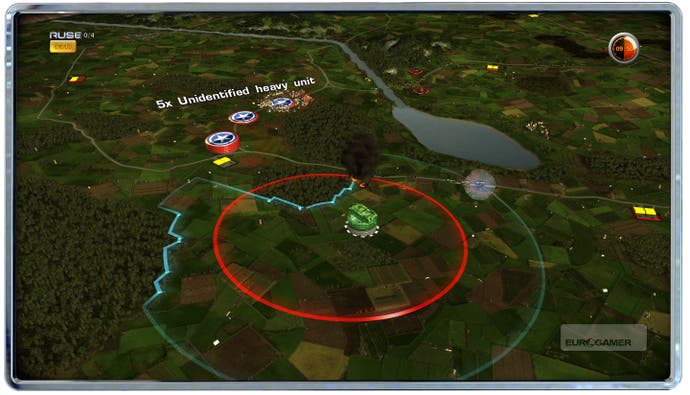R.U.S.E. Multiplayer Beta
Being decoy about it.
It's fair to say that RUSE feels like a boardgame, but it's also taking place in real-time, in a way that could only really work on an electronic game system. Boardgames, by their nature, tend to have trouble not being turn-based, and so the experience of RUSE is an unusual one. It is about deception, observation and, well, clever ruses. The central conceit of the game is that you can employ intelligence and counter-intelligence powers to fool and fox your enemy, just as you might in some militaristic card game. Of course, the real decision about who wins will still come down to firepower: this is the Second World War, with all the planes, tanks, artillery and men with guns that such a setting implies. RUSE is an unusual hybrid.
The first impression of RUSE is that this is another "long-zoom" game, where the map and the game space are one. When you zoom right out the gameworld is set in some kind of control room, and is reduced to slowly trundling icons. Zoom in and you can see the buildings, trees and even the movements of individual soldiers. It's not exactly visually breathtaking, but it's sort of functionally resplendent in a way that will make desktop general nod in sated approval.
The other thing that will strike most strategy players is how glacially slow the game can be, even in traditional strategy terms. Trucks from your base trundle out into the world in something like actual real-time, so it takes them several minutes to reach the supply depots which you must hold to gain income. Supply depots exist all across the map, and can be depleted if the game runs on for too long. Since they're far away from your starting base, they not only take a while to start supplying you, they're also at constant risk of attack, especially if your opponent is deploying fast jeeps and even-faster planes. Nevertheless you must connect to them, or be starved of cash.

There's an early lull in this process, which comes after you've spent your starting cash, and this lull is oddly tense, because it's the point at which both players are most vulnerable. You have very little money, and you have to start figuring out what your overall strategy is going to be. It's also at this stage that you're probably going to start playing some of your ruse cards. I generally go for something that reveals orders, or units, in the enemy area. That gives me an idea of what they might be up to, at least for a short period, and can give me a vital edge in the rock-paper-artillery game that lies ahead. If, as in the case of the game I played this morning, the guy is heavy on air defences, there's little point in my constructing an airstrip. When I also spot that he is building an airstrip, this means air defences will be essential to my own build from early in the process.


